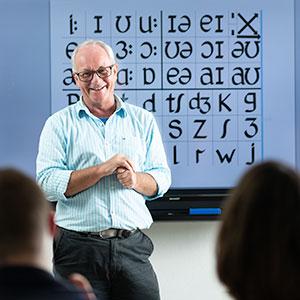6th May 2019
As much as many of you will sigh at the thought of written assignments, yes, there are assignments and they form the spine of the Trinity CertTESOL. There’s no getting away from it. The course is accredited at level 5 on the UK National Qualifications Framework, is equivalent to the first year of undergraduate study at a UK university, so does require a high standard of academic writing. Accurate and appropriate referencing of sources is required; plagiarism is taken very seriously. But, without exception though, trainees who successfully complete the course find the assignments beneficial, despite the hard work that goes into them. They are all focused on your development as a teacher, in both skills and language awareness.
Not counting the teaching practice and the language awareness test, there are four assignments:
- The Unknown Language Journal (UNL)
- The Guided Observation Journal (GOJ)
- The Learner Profile (LP)
- The Materials Assignment (MA)
This is the order in which the assignments are introduced, each one focusing on particular aspects of teaching and/or learning.
Unknown Language Journal
The first assignment of around 2000-3000 words usually completed in the first week of the course, the UNL presents you a unique opportunity to experience language learning from a learner’s perspective or at least remind you of what it is like. You and your co-trainees will participate in a series of four 1 hour lessons in a language that none of you have had experience of in the past. After each lesson you will write up a reflection of your experience in the lesson, focusing on lesson objectives, methods and your co-trainees reflections on the lesson (including an indication of how this experience compares with any previous learning experience). In each entry you will also be required to tabulate a 3 point contrastive analysis of the language and English, contrasting 1 vocabulary, 1 grammatical and 1 phonological element. This does require a little research but is useful and insightful. The assignment is rounded off with a 600 word post assignment reflection consolidating your experience over the four lessons and the all important ‘take-aways’.
Guided Observation Journal
Again around 2000-3000 words, this assignment is started in week 1 and gives you the opportunity to observe 3 live lessons and 1 video lesson, taught by experienced teachers (Usually your course trainers) with the learners you’ll soon be teaching. You’ll see the techniques you have been introduced to in action. Pro forma observation sheets will be provided with a list of techniques you are looking out for e.g. classroom management, error correction to think about the rationale for these and comment on their effectiveness with the class. Observation is an essential skill, so make the most of this assignment in focusing on identifying and evaluating the techniques you observe rather than simply describing the lessons ‘play by play’. You’ll be able to see how you can start to include what you observe into your own teaching. This assignment gives you the opportunity to read up on the techniques, using some of the essential books for the course e.g. Jim Scrivener’s ‘Learning Teaching’ and Jeremy Harmer’s ‘The Practice of English Language Teaching’ and include references in your assignment. As with the UNL, the assignment is rounded off with a post assignment reflection.
Learner Profile
This is a longer assignment, which gives you the chance to focus on analysing and evaluating an individual learner’s needs for their language development. You will interview the learner, evaluate their speaking, listening, reading and writing skills through tests, research their L1 in terms of contrasts with English.
Errors in their spoken and written English will be identified, compared to Standard British English by you and you will provide brief analyses as to why the learner might be making these errors e.g. contrasts between their L1 and English. This does require research and you will become familiar with the ‘go to’ book for this; Swan and Smith’s ‘Learner English, which is also useful when planning lessons.
Based on the data you collect you will you will develop a needs analysis for your learner and based on this plan and deliver a 1 hour 1:1 lesson to your learner and follow this up with a recommendation of 5 more lessons that you think will benefit your learner. A time consuming assignment, but beneficial to you as a teacher and the learner (as they’re getting this for free and think about how much it would cost them otherwise). You’ll be glad to hear that although you need to include a conclusion, there is no post assignment reflection.
Materials Assignment
A unique assignment in several ways, the MA is the only assignment that is assessed externally; by one of a team of Trinity College London moderators, who comes at the end of every course (not only for the MA, but as part of Trinity’s quality control). The MA is 500 words which is deceptively short, because the assignment needs a laser like focus and needs to be concise.
The MA is in two parts written and oral. The written part of 500 words follows a Trinity template with questions that need to be answered; the key here is to read the question properly and answer the question. This is where your analytical skills and laser like precision are needed! The oral part is a 10 minute interview with the moderator talking about your assignment e.g. why did you choose this teaching material for that group of learners? How would you change it, if you used it again?
The assignment itself requires you to evaluate a piece of teaching material used in one of your lessons on the course. It doesn’t require ‘reinventing the wheel’, creative is good, but not everyone is creative. It can be something original and creative, but something that has been adapted is just as good as long as you can justify its use in the lesson it was used. It doesn’t have to have been successful either; if you can explain why it wasn’t successful. This can be intimidating to some but can lead to good development as a teacher and possibly even refreshing to a moderator. Don’t worry. You’ll get guidance from your tutors on this and all the assignments and for the MA, you also get a practice interview to prepare you. In fact, you’ll get all the support you need.
With over 1000 trainees having passed the CertTESOL at English for Asia, the team is what you might say quite experienced.
If you're interested to learn more about the Cert TESOL course, join one of our free taster workshops held reguarly throughout the year.



